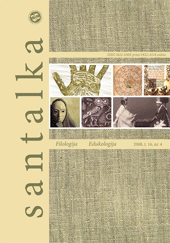Kai kurių šiuolaikinės kompiuterijos terminų mikrosistemų analizė
The Analysis of Some Contemporary Computer Mikrosystems
Author(s): Aušra Rimkutė, Angelė KaulakienėSubject(s): Language and Literature Studies
Published by: Vilnius Gediminas Technical University
Keywords: computer; hardware; interface; peripheral device; printer; software; scanner; terminal.
Summary/Abstract: In every language a twofold process could be observed: 1) a huge surge of new terms and 2) a big part of these new terms make their way into the common language. The nucleus of the vocabulary and the grammatical system of the common language make the essence of a language and its national originality. Because of such an intensive development in the future terminological lexis can become a basis of a common language and it ought to be not a spontaneously formed sum of terminological lexis, but an entirety of consciously created terms, which meet the requirements of language, logic and terminology. Computer terminology, by comparison with terminology of other fields, is being created in a slightly unusual way. The first computation institutions in Lithuania were established in early sixties and a decade later there were a few computation centres and a number of key-operated and punch machines working. Together with the new computational technology many new devices, units, parts, phenomena and characteristics appeared, which needed naming. Specialists faced an obvious shortage of Lithuanian terms for computing equipment. In 1971 this gap was partly filled by „Rusų-lietuvių-anglų kalbų skaičiavimo technikos žodynas“ (Russian-Lithuanian-English dictionary of computing equipment), which for a long time (for more than 20 years) was the only one terminological dictionary of this field. Only during nineties a few dictionaries of different scope appeared. Computer terminology from ten dictionaries, which are presently available, shows that 35 year period of computer terminology is a stage of its creation, the main features of which are reasonable synonymy (when both international term are being used to name the concept) and variability. Such state of Lithuanian computer terminology is predetermined by some linguistic, interlinguistic and sociolinguistic factors. At present in Lithuania terminological dictionaries of various fields are being given to the State Commission of the Lithuanian Language for its approval. The regulations of the evaluation of terminological dictionaries suggest two-level approbation. If terms are systematized and normalized to a satisfactory level, on the title page of the dictionary there is an inscription “The State Commission of the Lithuanian Language does not object”. If terms are systematized and normalized very well, the value of the most of terms is proven by the longer usage and the ratio of Lithuanian and borrowed terms is acceptable, the dictionary gets an approbations “The State Commission of the Lithuanian language approves”. All terminology dictionaries have an approbation of the first level. Thus doubts should arise concerning the needs of such an approbation.
Journal: Santalka: Filologija, Edukologija
- Issue Year: 16/2008
- Issue No: 4
- Page Range: 30-37
- Page Count: 8
- Language: Lithuanian

